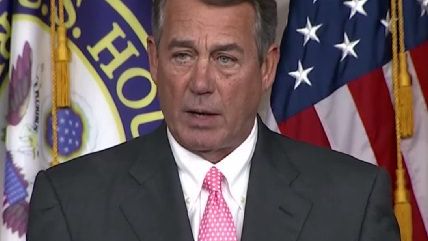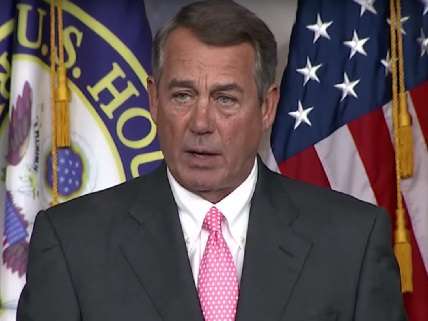Speak Now, Congress, or Forever Maintain the Status Quo
A to-do list for the new Speaker of the House


The House of Representatives is looking for a new speaker. Such times of change present a perfect opportunity for Congress to reflect on what it should aspire to achieve.
On top of the list is getting control of our fiscal situation by restraining government spending in ways that are consistent with a healthy and vibrant private sector. This will also make better tax policy more likely and help restrain debt levels.
As we know, the drivers of our Greek fiscal future are so-called entitlement programs, such as Medicare, Social Security, Medicaid, and Affordable Care Act subsidies. Though there is little chance of a short-term political victory with a divided government, Congress should nonetheless move some real reform proposals through committees to get the ball rolling.
The free market movement has provided many reform ideas over the years, so lawmakers have plenty of options to choose from. On Social Security, they range from private accounts to an expansion of Roth IRAs or traditional individual retirement accounts. On health care, they range from freeing the provision of health care from government-imposed constraints that cause ever-rising costs to Rep. Paul Ryan's plan and medical savings accounts. Many plans have also been proposed to replace or repeal the Affordable Care Act.
Regarding tax policy, one of my favorite options so far is a system of universal savings accounts like what Canada has. The Cato Institute's Chris Edwards explains: "Such accounts would be like [Roth IRAs], but for all types of savings, not just retirement savings. People would contribute after-tax income to USAs, and then all earnings and withdrawals would be completely tax-free." In other words, you could save for your retirement, kids' college education, vacations, or health care spending in one flexible account. It could also be a good alternative to Social Security and other failing programs.
Universal accounts would also kill (or at least wound) three birds with one stone—addressing our tax code's punishing double taxation of savings, encouraging savings and boosting personal financial security.
That leads me to fundamental tax reform. Tax reform is always on any Republican candidate's "if you vote for me" promise list, but the current Congress has failed to advance a comprehensive tax reform agenda—and that in spite of the biggest majority since 1928. Our tax code is complex and burdensome; it has 80,000 pages; it's expensive to understand and comply with; and it's a serious inhibitor of growth and innovation. It's also biased toward special interests.
It should be easy to come up with legislation that free market Republicans could support, seeing as many of the Republicans running for president have issued their own plans to get rid of special carve-outs, lower the rates and end the tax code's biases against saving and investment.
On the spending front, the biggest victory of the past seven years has been the implementation of spending caps, which in turn led to a certain level of budget restraint. These limits should stay in place, even if it means aggravating defense hawks and President Barack Obama. It would send a strong signal that this Congress is serious about fiscal responsibility.
Indeed, the caps could be expanded, as proposed by Rep. Kevin Brady's MAP Act. The lawmaker from Texas would extend the caps to cover so-called mandatory spending. And his plan should have broad GOP support because the defense budget no longer would be disproportionately impacted.
Finally, we can only hope that the current change in Congress will encourage a true dialogue about the need to move away from the many programs that exist for the sole purpose of boosting a few companies or an entire industry's bottom line. Special interest politics is bad economics and bad policy. A first step would be, of course, to keep the Export-Import Bank closed permanently and to move forward with a plan to wind down its activities.
There is much more to do—for example, fundamentally reforming the way we fund highways, addressing overregulation and freeing higher education from the nation's accreditation cartel—but those are some good conversation starters.
COPYRIGHT 2015 CREATORS.COM
Editor's Note: As of February 29, 2024, commenting privileges on reason.com posts are limited to Reason Plus subscribers. Past commenters are grandfathered in for a temporary period. Subscribe here to preserve your ability to comment. Your Reason Plus subscription also gives you an ad-free version of reason.com, along with full access to the digital edition and archives of Reason magazine. We request that comments be civil and on-topic. We do not moderate or assume any responsibility for comments, which are owned by the readers who post them. Comments do not represent the views of reason.com or Reason Foundation. We reserve the right to delete any comment and ban commenters for any reason at any time. Comments may only be edited within 5 minutes of posting. Report abuses.
Please to post comments


...but the current Congress has failed to advance a comprehensive tax reform agenda?and that in spite of the biggest majority since 1928.
Reforming the United States Tax Code is never going to happen. It's grown to "80,000 pages" on the backs of politicians getting themselves elected by promising a tax credit for this or an exemption for that. The code is likely the best tool for social engineering our leaders have.
It happened in the 80s, but that was before the Democrats fully became the Socialists.
Google pay 97$ per hour my last pay check was $8500 working 1o hours a week online. My younger brother friend has been averaging 12k for months now and he works about 22 hours a week. I cant believe how easy it was once I tried it out.
This is wha- I do...... ?????? http://www.buzznews99.com
"...addressing our tax code's punishing double taxation of savings....."
I see this a lot in Reason and elsewhere. But no one ever explains it. And for good reason - it's not true. We get taxed on income from savings, but there is nothing in the code that taxes the savings itself. That would be a wealth tax, and we don't have one.
I believe that it refers to the fact that saved dollars are after tax dollars, any gains are taxed, then the money is taxed once again when it is withdrawn and used.
If you're saying that gains on savings are taxed when earned and then they are taxed again when the money is withdrawn and used, can you cite any examples? I don't know of any cases where that's true. Gains get taxed once. Just like most income. But the savings themselves - the principal - are not. If you feel that taxing the gains on savings is double taxation, that's not the typical thinking. Double taxation is normally construed to be when earnings are taxed twice, such as when a corporation pays income on profits and then shareholders pay income taxes on dividends paid out of profits. But that's an atypical case.